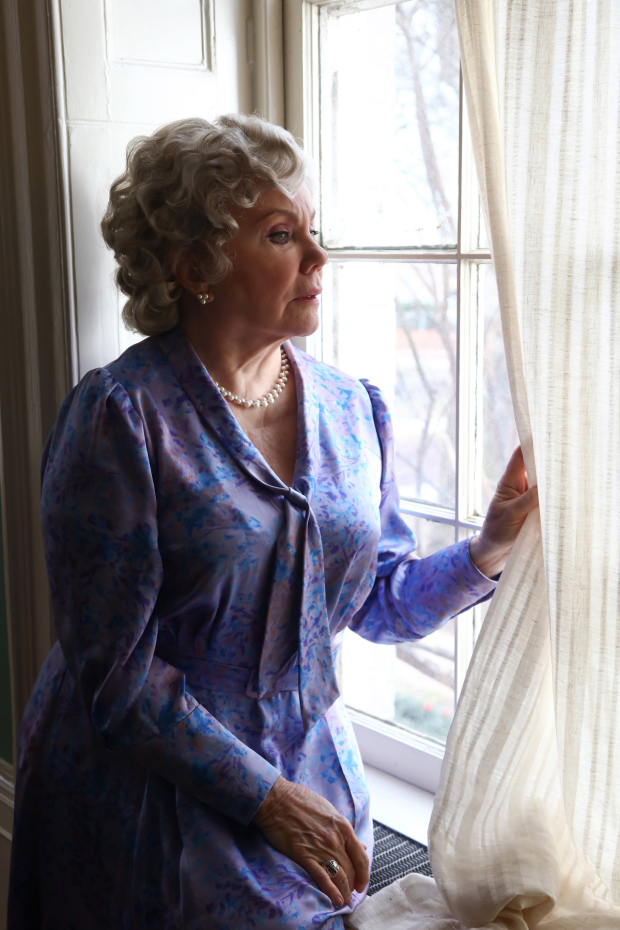Marsha Mason Finds Poetry and Prophecy in Lillian Hellman's Watch on the Rhine
"Female playwright" is a term inadvertently loaded with baggage — after all, there are no "female" playwrights, only playwrights. Even so, for better or worse, Lillian Hellman is indelibly marked as one of the most trailblazing members of that camp. With two Tony nominations and over a dozen works produced (and continually revived) on Broadway, her name has become a beacon for all women fighting for a place onstage — her moniker emblazoned on the Lilly Awards Foundation, an organization devoted to honoring and encouraging the work of women in American theater.
In a salute to the late playwright and political activist, Arena Stage artistic director Molly Smith has launched the Lillian Hellman Festival — a celebration of Hellman's work complete with readings, film screenings, panel discussions, and full productions. Hellman's political drama Watch on the Rhine is next on the company's Fichandler Stage, and Smith has recruited the formidable actress Marsha Mason to lead the cast as the play's matriarch Fanny Farrelly, with director Jackie Maxwell at the helm.
Written in 1941, just as America was being drawn into the epicenter of World War II, the play is set in the widow Fanny's refined southern home in Washington, D.C. When her daughter returns home after 17 years in Europe with her German anti-Fascist husband and their three children, the perils of a changing political climate begin to have immediate and intimate consequences.
Mason, while best known for her Oscar-nominated roles in films like Cinderella Liberty and The Goodbye Girl, is a six-time Broadway veteran and stage director in her own right. Arena has been an elusive destination for her, but after holding this slot on her calendar for over a year (a risky move when film and television often push theater to the back of the line), she's ready to take on the words of a woman whose work she believes to have earned a spot in the hall of the greats — and not just in the "female" corner.
This interview has been condensed and edited for clarity.

(photo provided by Arena Stage)
How did this chance to do Watch on the Rhine come your way?
Molly Smith, the artistic director, and I had been trying to get me to come here for several years now and it just never quite worked out. Originally she asked me to do The Little Foxes a number of years ago and I wasn't able to do it. Then she came up with this terrific idea of the Lillian Hellman Festival. I remembered watching the movie [Watch on the Rhine] years and years ago when I was in high school — I was a big Bette Davis fan. This play is just sensational. It resonates today so much in terms of our contemporary world. There are lines in the play that are just so prescient, it's remarkable.
Are you coming into this play a Lillian Hellman fan?
I'm certainly a great admirer. I read most of her autobiography Pentimento, and I just found her a really interesting, complex, stunning woman. I remember watching the old tapes of the McCarthy hearings and she was so strong. She didn't cave, and she stood very tall in my mind. So I was just thrilled to be able to do this. And then on a personal level, it's just such an incredible role — so complex and so filled with contradictions.
How do you see Fanny's role within this family? She doesn't necessarily facilitate the action but she's certainly in the center of it.
I think Fanny represents a world that is no longer. She's filled with the contradictions of an earlier age. She's bright, she's smart, she's intelligent, and she knows many languages. She happily married, raised her children — perhaps a bit too rigidly in her daughter's opinion — and has to face a changing world that is just really complicated for her. So I love that there's a kind of rigidity to her personality or control and then her having to surrender to a world that is much more frightening than she ever imagined.
In rehearsal, are you all making a conscious effort to draw parallels between what happens in this play and current events outside your door in Washington, D.C.?
I don't think we even have to try. Kurt, the German anti-Fascist character, talks about how "the Fascists came in on the shoulders of the big business men that were legends." My character also makes an interesting statement to him when we first meet. I ask him if he's a "radical," which you could totally substitute with, "Are you a terrorist?" The resonance is really extraordinary. Lillian Hellman is in the halls of those wonderful playwrights like Inge and O'Neill and Miller. All we have to do is say it clearly and focus on what's important and it'll be there.
Was this inherent relevance one of Molly Smith's reasons for wanting to do Watch on the Rhine and the Lillian Hellman Festival in general?
I think mostly Molly really wanted to support women playwrights. She's always on the lookout for female voices and she's particularly fond of Lillian Hellman's writing. Last year I came down for the Women's Voices Theater Festival. They got several theaters in the Washington area to commission women playwrights and they were done all over the city. I think there were twenty-three of them. It was fabulous.
As both a director and an actress, why do you think it's important for women to be represented in the theater?
First of all, because it's just good sense in terms of equality. But also, I believe women can bring a perspective to material that is unique, just the same way that men bring their perspective. There's an imbalance in terms of an overall possibility of discussion and point of view. A woman's perspective is often different from a man's, and I think those differences are very exciting and positive. But we have to see them first in order to understand that.

(© Tony Powell)











